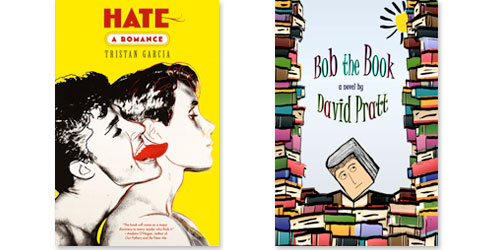by Richard Labonte

"Hate: A Romance," by Tristan Garcia, translated by Marion Duvert and Lorin Stein. Faber & Faber, 288 pages, $14 paper.
The men who hate in Garcia's provocative debut novel – an award-winner when published in France two years ago – once loved each other. Will is first seen as an awkward country teen, fumbling with his physical self-esteem; passionate about the arts, he makes his way to Paris in 1989, a pontificating club kid before spiraling into drugs. Salvaged by journalist Elizabeth – from whose perspective the novel is narrated – he meets her friend, one-time Communist Dominique, a few years older and soon seduced by the younger man's punk charm and blossoming intellect. Standard boy-meets-boy stuff – except that, after Will contracts HIV (from whom is never clear), their lives diverge dramatically. Dominique (Doum), also HIV-positive, becomes an acclaimed safe sex advocate; Will, by this point something of a public intellectual, becomes a proponent of barebacking. It would be a mistake to pigeonhole this controversial book as solely about the politics of sex and AIDS, however; it's first a heady intellectual narrative, a rich novel of ideas, and then, amidst the tumult of personalities at war with each other, it's the story of a romance.
"Whatever Gods May Be," by Sophia Kell Hagin. Bold Strokes Books, 288 pages, $16.95 paper.
Written by a lesbian, published by a lesbian press, about a lesbian Marine rising steadily through the ranks during a vicious counter-insurgency war fought over oil rights in the Asian Pacific, this physically and psychologically intense war novel has balls. It has romance too, beginning in boot camp, as teenager Jamie Gwynmorgan – derided as "twat leader" by male colleagues – is drawn to sultry Martina Rhys, the other woman in her platoon. But their simmering sexual tension is secondary to Hagin's incendiary story about women proving themselves as adept at killing as men – all the while coping with the sexism and homophobia still rampant in a near-future military where "queer became legal and cunts got the right to qualify for combat duty." The blood of battle courses through this novel's pages with an astonishing relentlessness; the harrowing experience of prolonged interrogation becomes horrifically riveting. This isn't a novel for the faint of heart. It is a novel for fans of straight-up war stories, with a dash of the supernatural on the side.
"The Guest List: How Manhattan Defined American Sophistication – from the Algonquin Round Table to Truman Capote's Ball," by Ethan Mordden. St. Martin's Press, 324 pages, $29.99 hardcover.
Though there are several "name" queers in Mordden's nimble survey of Manhattan's social elite through the middle of the 20th century – Truman Capote, of course, in the '60s, and Cole Porter before him – this zippy cultural history gazes well beyond the gays. It covers a lost era in intellectual and artistic life: the period, to the author's mind, when New York (and, more particularly, the island of Manhattan) set the standard and the style for American popular culture – a time hard now to fathom as American culture has coarsened and the "heartland" sneers at arts and letters elites. There was a time, though, when sassy Dorothy Parker and pragmatic Edna Ferber, saucy Ethel Waters and firebrand Dorothy Thompson, tattletale Walter Winchell and feisty John O'Hara were stars. And Porter and Capote were, too; Truman's fabled Black and White Dance of 1996 (according to the invitation, though it's memorialized as a Ball) is Mordden's cutoff point, the moment in time when Manhattan's elites stopped mattering as much to America.
"Bob the Book," by David Pratt. Chelsea Station Editions, 188 pages, $16 paper.
If ever there were a book for lovers of books, this is it. More specifically, it's a book about a book about queer erotica, Bob the Book (known to browsing customers as "Private Pleasures: Myth and Representation in Male Photo Sets and Pornography from the Pre-Stonewall Era to 1979"), who falls in love with a book named Moishe ("Beneath the Tallis: The Hidden Lives of Gay and Bisexual Orthodox Jewish Men"), which he's shelved next to in a New York bookstore, Gay Diversions. They flirt, two quite different tomes drawn to one another, until one terrible day they are separated. The picaresque adventure that ensues shuttles Bob from his cozy bookstore home to the dusty anonymity of a used book sale, where he encounters the kinds of books he'd never have met at Gay Diversions. This charming novel, recounted by Pratt with seamless insight into the inner lives of books, is told almost entirely by Bob and the books around him – a seductive and eloquent literary accomplishment that, at last, answers the question: What is a gay book?
Featured Excerpt
Today we know that AIDS is above all the name, you know, of a moral argument that's trying to police our sexuality. All this sex panic, now that AIDS is more or less curable – we can see that it's been co-opted to make the queer community normal, acceptable. That they've assimilated us in order to castrate us. And now when you see a man like Doum, a counterrevolutionary of the right, collaborating with the French Ministry of Health, which dates from Vichy, to advocate a universal ban on free sex – well, what are you supposed to think?
From "Hate: A Romance," by Tristan Garcia
Footnotes
Two months after parting ways with Alyson Books, Don Weise has launched Magnus Books with plans to publish 15 to 20 fiction and nonfiction titles a year, starting with the Fall 2011 season. Negotiations between Weise, who hoped to spin off the publisher as a separate company, and Here Media, Alyson's owner, broke down in October. Now, "as owner and publisher of Magnus I have complete freedom for the first time in my career, working entirely on my own and independent of parent companies or affiliations," said Weise, who lost his position as an editor at Carroll & Graf when that publisher was bought by Perseus Books and subsequently closed. He left Alyson after financially strapped Here Media – which bought Alyson Books and the Advocate and Out magazines, among other properties from PlanetOut several years ago – was slow paying royalties on book sales and advances for new titles Weise had signed for publication in 2010 and 2011. "I'm tremendously excited by this long-awaited opportunity. With 18 years in the business, the majority of that devoted to LGBT books, the path has been pointed in this direction for quite some time," said Weise, who hopes to be able to announce new titles soon. "While I love that all this came together so fast, the one downside is I didn't have anyone signed at the point of announcement," he said. "That will take a couple more weeks."










